 MyDogBreeds
MyDogBreeds Miniature Siberian Husky is originated from United States but German Pinscher is originated from Germany. Miniature Siberian Husky may grow 11 cm / 4 inches shorter than German Pinscher. Miniature Siberian Husky may weigh 9 kg / 19 pounds lesser than German Pinscher. Both Miniature Siberian Husky and German Pinscher has same life span. Both Miniature Siberian Husky and German Pinscher has almost same litter size. Miniature Siberian Husky requires Moderate maintenance. But German Pinscher requires Low maintenance
Miniature Siberian Husky is originated from United States but German Pinscher is originated from Germany. Miniature Siberian Husky may grow 11 cm / 4 inches shorter than German Pinscher. Miniature Siberian Husky may weigh 9 kg / 19 pounds lesser than German Pinscher. Both Miniature Siberian Husky and German Pinscher has same life span. Both Miniature Siberian Husky and German Pinscher has almost same litter size. Miniature Siberian Husky requires Moderate maintenance. But German Pinscher requires Low maintenance
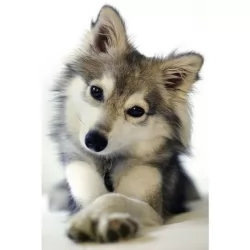 Miniature Siberian Huskies – also known as mini huskies – are your regular Siberian husky bred to be that much smaller than what the breed standard dictates.
Miniature Siberian Huskies – also known as mini huskies – are your regular Siberian husky bred to be that much smaller than what the breed standard dictates.
They’re sought after by those who love the regular sized Siberian Husky but who find the larger dog too large and boisterous. They come complete with the looks and the temperament of the Siberian Husky but they are smaller.
The origins of these gorgeous Mini huskies is conflicting though as some believe they originated in the USA. The name of Bree Normandin is bandied about when talking of the breed’s origin while other refer to Linda S. Spurlin from Alaska. She became interested in them when her full-sized husky became pregnant by a small dog.
Spurlin used Siberian and Alaskan Huskies as well as small Schipperkes and American Eskimo Dogs to bring about the mini version. They’ve got the same pedigree as the Siberian Husky, but it has been selectively bred for its smaller size, also coming from the Spitz family of dogs.
The Miniature Husky is genetically the same as the larger Siberian Husky and the AKC doesn’t recognize it as a separate breed, but sees it as a different size variation of the working-group Siberian Husky.
 The German Pinscher or Deutscher Pinscher originates in Germany. When you look at the dog you can see the the Doberman, the Rottweiler, Schnauzer, Affenpinscher and Miniature Pinscher have all played a role in the dog’s development.
The German Pinscher or Deutscher Pinscher originates in Germany. When you look at the dog you can see the the Doberman, the Rottweiler, Schnauzer, Affenpinscher and Miniature Pinscher have all played a role in the dog’s development.
There have been drawings of the German Pinscher which have been seen in dog books as early as 1884 and some drawings even earlier than this date. The dogs have descended from early European herding breeds.
The German Pinscher came to breeders of the United States in the 1980s, and the German Pinscher Club of America was started by German Pinscher fanciers, with the dog gaining acceptance by the Canadian Kennel Club in 2000.
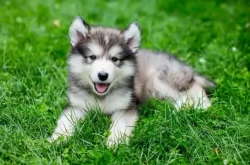 Known also as the Alaskan Klee Klai,the Miniature Siberian Husky stands at 33-39cm in height and weighs between 8 - 11kg.
Known also as the Alaskan Klee Klai,the Miniature Siberian Husky stands at 33-39cm in height and weighs between 8 - 11kg.
These mini huskies are like the larger huskies and can also come in a range of color variations such as grey and white, black and white or red and white for instance. In typical Spitz dog fashion they have the erect ears and long bushy tail. A striking feature of these dogs is the beautiful eyes – they can be brown but also a mesmerising blue.
This Miniature Siberian Husky is an intelligent dog and you’re not going to have any trouble with him teaching him some basic commands such as sit, lie-down and stay.
You need to know that these dogs aren’t going to be content lying around all day and that they want to be kept busy almost around the clock. They have always been working dogs so he will need plenty of mental – and physical exercise to keep him content. A bored, frustrated Mini Husky will just develop problem behavior through no fault of his own. People who buy high energy dogs have a responsibility towards them to keep them busy and well exercised.
These dogs are similar to their genetic ancestor, the wolf, and instead of barking, you may find him trying to communicate with a howl. One thing is sure, they make great family pets, and their gentle nature allows them to get on well with children and also not to show aggression with other dogs. They’re loyal, outgoing and charming.
 The German Pinscher is a medium sized dog with a square build, looking very much like the Doberman Pinscher we know so well, but slightly smaller. Dogs and bitches stand roughly 45 to 50cm at the withers and the dog weighs between 14 to 20kg.
The German Pinscher is a medium sized dog with a square build, looking very much like the Doberman Pinscher we know so well, but slightly smaller. Dogs and bitches stand roughly 45 to 50cm at the withers and the dog weighs between 14 to 20kg.
The dog is lean and muscular with a tight fitting skin. He has a short, smooth coat which can be brown, reddish brown or black and tan. He has a black nose, dark eyes and he has either high set drop ears or the ears are specifically erect.
In fact, with German Pinschers, they have always had their ears cropped and their tails docked, but these days the tail is left and unfortunately that distinctive look is gone.
Energetic, spirited, lively, confident, intelligent, fearless and loyal are just some of the characteristics of this amazing dog who is guaranteed to make you an excellent watchdog and companion.
The German Pinscher is a playful, good natured dog and he’ll make a good pet for households where there are other pets as well as children. He is a loving and loyal companion with an even temperament, although he is strong-willed and stubborn and will therefore need training and socialization. He then becomes a super obedient pet.
He can fit into city- or country life but he is an energetic dog and will certainly require being exercised every day. Like any other dog, he can become bored and frustrated when put into the backyard and left there by himself day after day.
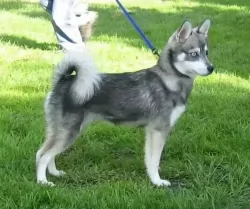 Your cuddly Mini Siberian Husky is such an intelligent dog, active and social and guaranteed to make you a splendid pet.
Your cuddly Mini Siberian Husky is such an intelligent dog, active and social and guaranteed to make you a splendid pet.
Being somewhat wary and aloof with strangers, they also make good watchdogs. They do well with children who have been taught to be kind and gentle with animals.
With good care your dog can reach up to 15 years of age, providing you with many years of superb friendship.
 The German Pinscher is a working dog bounding in energy. He just loves being involved with all the activities of his human family.
The German Pinscher is a working dog bounding in energy. He just loves being involved with all the activities of his human family.
He is playful and assertive and will require a firm, balanced owner who is consistent with the rules laid down for the dog. It will be more than worthwhile having him trained and socialized as he becomes obedient, loyal and devoted.
He is intelligent and quick to learn and it simply turns him into a splendid pet. Add him to your family, and you’ll feel as though you’ve added a wonderful dimension to your home.
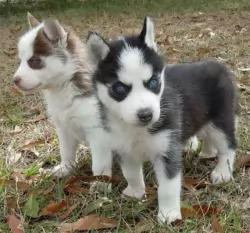 Your Miniature Siberian Husky is a healthy dog and you won’t have to spend too much money on him at the vet. However, just like with any other dog, he can battle with some of the common dog diseases -
Your Miniature Siberian Husky is a healthy dog and you won’t have to spend too much money on him at the vet. However, just like with any other dog, he can battle with some of the common dog diseases -
This eye problem affects about 10% of all Siberian Huskies and its not limited to old dogs. Juvenile cataracts can affect young dogs too. Luckily the problem isn’t painful for the dog.
Skin problems can be a concern for the Mini Siberian Husky, especially as one is used to seeing these dogs with thick coats. Follicular dysplasia is a genetic condition that causes patchy hair loss as well as a scaly, infected skin.
Check out that your dog is receiving nutritious food with vitamins and minerals as a zinc deficiency for instance can cause hair loss as well as skin problems.
 When you see your German Pinscher standing lean and strong, you can’t think of him ever getting an illness. And yet, even a strong dog like this, who can reach 10 – 14 years of age with good nutrition, can get sick.
When you see your German Pinscher standing lean and strong, you can’t think of him ever getting an illness. And yet, even a strong dog like this, who can reach 10 – 14 years of age with good nutrition, can get sick.
Look out for von Willebrand's blood-clotting disorder as well as heart disease and hip dysplasia with your German Pinscher.
This is a blood disease where there is a deficiency of von Willebrand Factor which results in the blood not clotting properly. The condition can lead to excessive bleeding with your pet after he has had an injury for instance.
You may notice bleeding from the gums, bloody urine or feces as well as bruising of the skin. Get him to the vet who will perform an examination of your pet.
Remember that some health problems seen in a dog are inherited, and if you can get certificates from the breeders proving that the parents have been cleared of hereditary eye diseases, hip dysplasia and blood clotting disease for instance, your dog will have less risks of developing any of these serious conditions.
Also many illnesses can be eliminated by providing your pet with excellent food, clean water, a warm dry place to sleep and lots of love and attention.
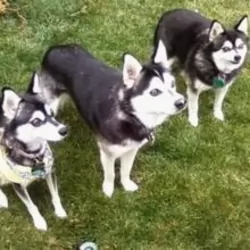 The Miniature Husky is an active and energetic breed that is going to require a lot of exercise. He is able to adapt to life in the city or the countryside but wherever you keep him as a pet, he will require regular daily exercise.
The Miniature Husky is an active and energetic breed that is going to require a lot of exercise. He is able to adapt to life in the city or the countryside but wherever you keep him as a pet, he will require regular daily exercise.
These dogs are used to cold climates so make sure your Mini Siberian Husky doesn’t overheat. Make sure that when he’s outdoors, there is shade for him and a water bowl. You’ll be doing him a real favor if you provide him with a small paddling pool to dip into on a hot day.
These are clean, odorless dogs that actually require little human help to be groomed. You can give your dog a good brush twice a week.
Mini Siberian Huskies, like the larger breed, have a high metabolism, so small amounts of highly nutritious food will do well with them. If you intend feeding your one commercially manufactured food, make sure its the high quality food that comes with plenty of minerals and vitamins. Try and avoid the low quality brands that come packed with unhealthy preservatives and colorants.
Dogs do well on simple, nutritious diets, so some boiled chicken, brown rice and raw and cooked vegetables such as carrots, potatoes and spinach added into the dry kibble from time to time will do him wonders.
Also try and include some raw meat into the kibble from time to time. That's it, as simple as that- no exotic, spicy foods and foods which we humans eat such as nuts, chips and chocolate – all can be toxic for your pet and just give him an upset stomach.
Make sure fresh, cool water is constantly available.
 The German Pinscher, because he is a muscular, energetic dog, should be fed a high-quality dog food that suits his size and his energy levels. If you feed him one of the commercially manufactured dog foods, make sure of the ingredients, as you don’t want food that is full of fillers, colorants and preservatives.
The German Pinscher, because he is a muscular, energetic dog, should be fed a high-quality dog food that suits his size and his energy levels. If you feed him one of the commercially manufactured dog foods, make sure of the ingredients, as you don’t want food that is full of fillers, colorants and preservatives.
Choose high quality foods and sometimes mix in your own home cooked brown rice, vegetables and chicken. Adding in some raw meat occasionally will enhance his health too and help him towards staving off common dog illnesses. He should always have access to fresh, cool water.
He is a high energy dog and will require hectic exercise such as ball- and rope-pulling games, hikes, swimming and walks every day.
His short, smooth coat will require brushing twice a week to remove loose hairs and help it to maintain that sleek, glossy look.
Remember to check his ears for wax and dirt build up as well as for ear hematomas. These swellings inside your dogs ear can also be as a result of something stuck inside your dog’s ear or from your dog scratching his ear because of mites.